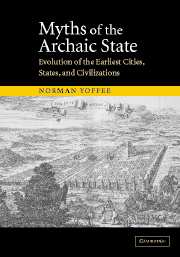Book contents
- Frontmatter
- Contents
- List of figures
- List of tables
- INTRODUCTION
- 1 THE EVOLUTION OF A FACTOID
- 2 DIMENSIONS OF POWER IN THE EARLIEST STATES
- 3 THE MEANING OF CITIES IN THE EARLIEST STATES AND CIVILIZATIONS
- 4 WHEN COMPLEXITY WAS SIMPLIFIED
- 5 IDENTITY AND AGENCY IN EARLY STATES: CASE STUDIES
- 6 THE COLLAPSE OF ANCIENT STATES AND CIVILIZATIONS
- 7 SOCIAL EVOLUTIONARY TRAJECTORIES
- 8 NEW RULES OF THE GAME
- 9 ALTERED STATES: THE EVOLUTION OF HISTORY
- Acknowledgments
- References
- Index
7 - SOCIAL EVOLUTIONARY TRAJECTORIES
Published online by Cambridge University Press: 22 September 2009
- Frontmatter
- Contents
- List of figures
- List of tables
- INTRODUCTION
- 1 THE EVOLUTION OF A FACTOID
- 2 DIMENSIONS OF POWER IN THE EARLIEST STATES
- 3 THE MEANING OF CITIES IN THE EARLIEST STATES AND CIVILIZATIONS
- 4 WHEN COMPLEXITY WAS SIMPLIFIED
- 5 IDENTITY AND AGENCY IN EARLY STATES: CASE STUDIES
- 6 THE COLLAPSE OF ANCIENT STATES AND CIVILIZATIONS
- 7 SOCIAL EVOLUTIONARY TRAJECTORIES
- 8 NEW RULES OF THE GAME
- 9 ALTERED STATES: THE EVOLUTION OF HISTORY
- Acknowledgments
- References
- Index
Summary
The worst thing one can do with words is to surrender to them.
george orwellAlthough recent investigations into the collapse of states have opened new avenues to the exploration of social change that does not lead to “higher” levels of social integration, archaeologists are only beginning to consider the evolutionary distinctiveness of prehistoric societies that few would label a state. These societies have their own histories and cannot be relegated as stages in overall global trajectories towards states. For example, Susan McIntosh and colleagues (McIntosh 1999) have discarded the old neo-evolutionist band-tribe-chiefdom-state taxonomy in order to characterize “alternate” forms of leadership in prehistoric African societies. In his Society Against the State, the anthropologist Pierre Clastres (1989) argued that some societies not only were not on a putative, normative pathway to statehood but also resisted such a social trajectory.
To the extent that archaeologists have sought to explain different evolutionary pathways, they have, not unnaturally, focused on environmental conditions. In prehistoric Australian hunter-gatherer societies, one observes no great inequalities in economic power, no privileged access to symbols of community legitimacy that integrate forms of social heterogeneity, and no specialized political roles apart from those determined within the web of kinship (Mulvaney and Kamminga 1999; Murray 1998). Although significant changes in technology and economy occurred in Australian prehistory, they did not lead to village farming communities, much less states.
- Type
- Chapter
- Information
- Myths of the Archaic StateEvolution of the Earliest Cities, States, and Civilizations, pp. 161 - 179Publisher: Cambridge University PressPrint publication year: 2005



